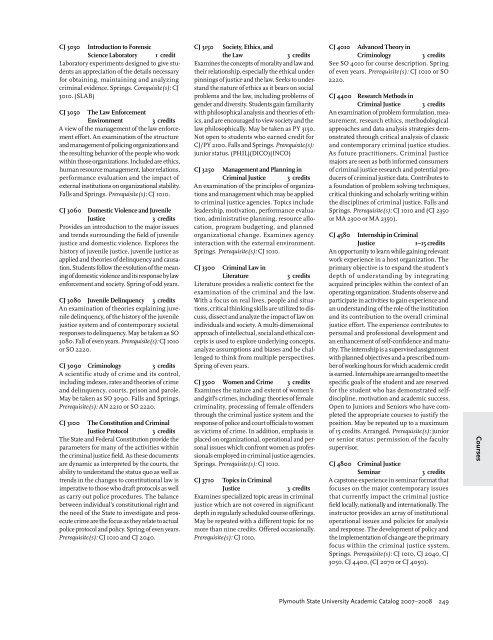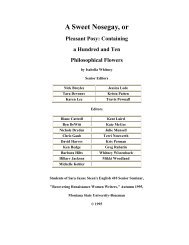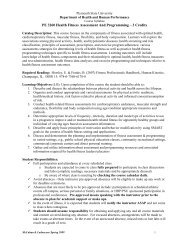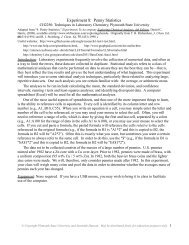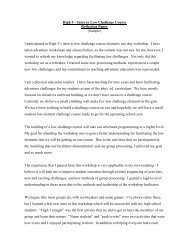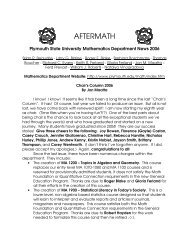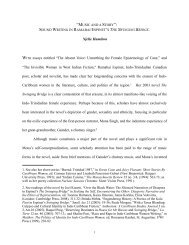2007-2008 Undergraduate Academic Catalog - Plymouth State ...
2007-2008 Undergraduate Academic Catalog - Plymouth State ...
2007-2008 Undergraduate Academic Catalog - Plymouth State ...
- No tags were found...
You also want an ePaper? Increase the reach of your titles
YUMPU automatically turns print PDFs into web optimized ePapers that Google loves.
CJ 3030 Introduction to ForensicScience Laboratory 1 creditLaboratory experiments designed to give studentsan appreciation of the details necessaryfor obtaining, maintaining and analyzingcriminal evidence. Springs. Corequisite(s): CJ3010. (SLAB)CJ 3050 The Law EnforcementEnvironment 3 creditsA view of the management of the law enforcementeffort. An examination of the structureand management of policing organizations andthe resulting behavior of the people who workwithin those organizations. Included are ethics,human resource management, labor relations,performance evaluation and the impact ofexternal institutions on organizational stability.Falls and Springs. Prerequisite(s): CJ 1010.CJ 3060 Domestic Violence and JuvenileJustice3 creditsProvides an introduction to the major issuesand trends surrounding the field of juvenilejustice and domestic violence. Explores thehistory of juvenile justice, juvenile justice asapplied and theories of delinquency and causation.Students follow the evolution of the meaningof domestic violence and its response by lawenforcement and society. Spring of odd years.CJ 3080 Juvenile Delinquency 3 creditsAn examination of theories explaining juveniledelinquency, of the history of the juvenilejustice system and of contemporary societalresponses to delinquency. May be taken as SO3080. Fall of even years. Prerequisite(s): CJ 1010or SO 2220.CJ 3090 Criminology 3 creditsA scientific study of crime and its control,including indexes, rates and theories of crimeand delinquency, courts, prison and parole.May be taken as SO 3090. Falls and Springs.Prerequisite(s): AN 2210 or SO 2220.CJ 3100 The Constitution and CriminalJustice Protocol 3 creditsThe <strong>State</strong> and Federal Constitution provide theparameters for many of the activities withinthe criminal justice field. As these documentsare dynamic as interpreted by the courts, theability to understand the status quo as well astrends in the changes to constitutional law isimperative to those who draft protocols as wellas carry out police procedures. The balancebetween individual’s constitutional right andthe need of the <strong>State</strong> to investigate and prosecutecrime are the focus as they relate to actualpolice protocol and policy. Spring of even years.Prerequisite(s): CJ 1010 and CJ 2040.CJ 3150 Society, Ethics, andthe Law3 creditsExamines the concepts of morality and law andtheir relationship, especially the ethical underpinningsof justice and the law. Seeks to understandthe nature of ethics as it bears on socialproblems and the law, including problems ofgender and diversity. Students gain familiaritywith philosophical analysis and theories of ethics,and are encouraged to view society and thelaw philosophically. May be taken as PY 3150.Not open to students who earned credit forCJ/PY 2100. Falls and Springs. Prerequisite(s):junior status. (PHIL)(DICO)(INCO)CJ 3250 Management and Planning inCriminal Justice 3 creditsAn examination of the principles of organizationsand management which may be appliedto criminal justice agencies. Topics includeleadership, motivation, performance evaluation,administrative planning, resource allocation,program budgeting, and plannedorganizational change. Examines agencyinteraction with the external environment.Springs. Prerequisite(s): CJ 1010.CJ 3300 Criminal Law inLiterature3 creditsLiterature provides a realistic context for theexamination of the criminal and the law.With a focus on real lives, people and situations,critical thinking skills are utilized to discuss,dissect and analyze the impact of law onindividuals and society. A multi-dimensionalapproach of intellectual, social and ethical conceptsis used to explore underlying concepts,analyze assumptions and biases and be challengedto think from multiple perspectives.Spring of even years.CJ 3500 Women and Crime 3 creditsExamines the nature and extent of women’sand girl’s crimes, including: theories of femalecriminality, processing of female offendersthrough the criminal justice system and theresponse of police and court officials to womenas victims of crime. In addition, emphasis isplaced on organizational, operational and personalissues which confront women as professionalsemployed in criminal justice agencies.Springs. Prerequisite(s): CJ 1010.CJ 3710 Topics in CriminalJustice3 creditsExamines specialized topic areas in criminaljustice which are not covered in significantdepth in regularly scheduled course offerings.May be repeated with a different topic for nomore than nine credits. Offered occasionally.Prerequisite(s): CJ 1010.CJ 4010 Advanced Theory inCriminology 3 creditsSee SO 4010 for course description. Springof even years. Prerequisite(s): CJ 1010 or SO2220.CJ 4400 Research Methods inCriminal Justice 3 creditsAn examination of problem formulation, measurement,research ethics, methodologicalapproaches and data analysis strategies demonstratedthrough critical analysis of classicand contemporary criminal justice studies.As future practitioners, Criminal Justicemajors are seen as both informed consumersof criminal justice research and potential producersof criminal justice data. Contributes toa foundation of problem solving techniques,critical thinking and scholarly writing withinthe disciplines of criminal justice. Falls andSprings. Prerequisite(s): CJ 1010 and (CJ 2350or MA 2300 or MA 2350).CJ 4580 Internship in CriminalJustice1–15 creditsAn opportunity to learn while gaining relevantwork experience in a host organization. Theprimary objective is to expand the student’sdepth of understanding by integratingacquired principles within the context of anoperating organization. Students observe andparticipate in activities to gain experience andan understanding of the role of the institutionand its contribution to the overall criminaljustice effort. The experience contributes topersonal and professional development andan enhancement of self-confidence and maturity.The internship is a supervised assignmentwith planned objectives and a prescribed numberof working hours for which academic creditis earned. Internships are arranged to meet thespecific goals of the student and are reservedfor the student who has demonstrated selfdiscipline,motivation and academic success.Open to Juniors and Seniors who have completedthe appropriate courses to justify theposition. May be repeated up to a maximumof 15 credits. Arranged. Prerequisite(s): junioror senior status; permission of the facultysupervisor.CJ 4800 Criminal JusticeSeminar3 creditsA capstone experience in seminar format thatfocuses on the major contemporary issuesthat currently impact the criminal justicefield locally, nationally and internationally. Theinstructor provides an array of institutionaloperational issues and policies for analysisand response. The development of policy andthe implementation of change are the primaryfocus within the criminal justice system.Springs. Prerequisite(s): CJ 1010, CJ 2040, CJ3050, CJ 4400, (CJ 2070 or CJ 4050).Courses<strong>Plymouth</strong> <strong>State</strong> University <strong>Academic</strong> <strong>Catalog</strong> <strong>2007</strong>–<strong>2008</strong> 249


